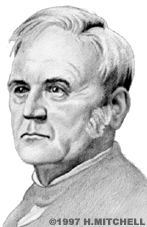John Deere
John Deere, pioneer, inventor, and entrepreneur, singlehandedly revolutionized American agriculture by developing and marketing the world's first self-polishing cast steel plow. Born in Vermont in 1804, young Deere worked as a blacksmith's apprenticeship. By 1825, he was famous for the literal and figurative polish of his farm equipment, but later, when Vermont's economy began to suffer, he decided to emigrate to the Midwest in 1836. Two days after arriving in Grand Detour, Illinois, Deere had built a forge and was back in business.
Deere learned from his new customers that the cast-iron plows that they brought with them from the East were unable to cope with the thicker, tackier soil of the Midwest. While plowing, farmers had to stop every few feet to scrape off the damp earth that clung to the plowshare (the cutting blade).
With some help from a fellow Vermont native, Major Leonard Andrus, Deere invented a remedy. He shaped steel from an old sawmill blade for the plowshare and joined it to a specially curved, wrought iron moldboard (the blade that lifts and turns the soil). He polished both parts so smooth that the damp soil would not stick to them. Deere's Self-Polishing Plow, later patented #46,454, was a sensation from its first trial run in 1837.
Though he and Andrus soon had a booming business, Deere never stopped refining his designs. As he used to say, "If we don't improve our product, somebody else will." In 1846, Deere had a Pittsburgh company roll the country's first cast steel plow. He also made a commercial innovation. At that time, blacksmiths made goods only on order, but Deere, who had a sure thing, mass-produced his plows and then took them on sales tours.
By 1855, Deere was selling over 13,000 plows per year. He died in 1886, but the corporation he formed in 1868, Deere & Company, survives as one of the nation's oldest and largest manufacturers, with over $34 billion in international net sales and revenues.


